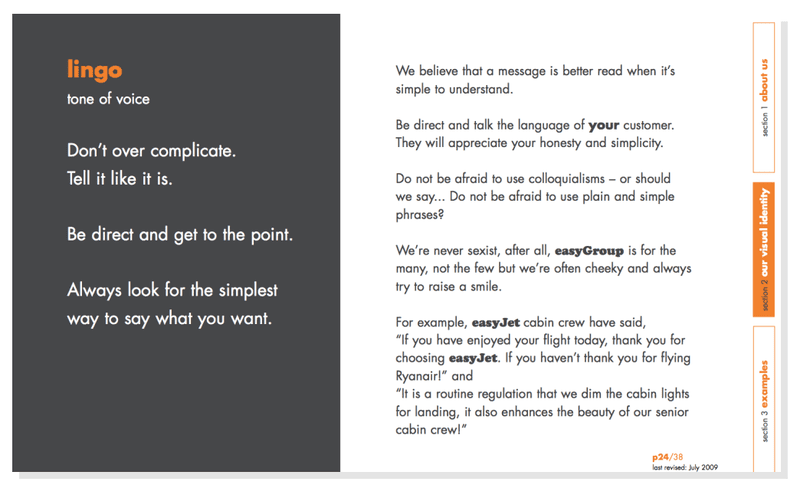Tone of voice
Having written and overseen the writing of hundreds of charity communications, I've come to the conclusion that the instructional approach that so many brand guidelines take to defining 'tone of voice' simply doesn't work when it comes to specifying how non-profits must use language. Most direction is either unnecessary or confusing.
If we look at just a few examples of the adjectives that regularly appear in 'tone of voice' guidelines, you'll see what I mean.
Positive
What's the point? I'm writing for a charity. I'm hardly going to be negative about what a donor can achieve with a gift. Neither am I going to present the challenge a charity faces as being insurmountable.
Honest
Cripes, lucky this was there otherwise I'd just lie about everything the charity does.
Respectful
And there I was just about to kick off with a long tirade of patronising and sarcastic abuse. Phew! That was a near miss.
Passionate
If we are going to get people to act, passion is central to our offer. I don't need to be told it has to be included.
Caring
You mean you don't do this for the money?
I could go on, but hopefully the point is clear. Certain characteristics are shared by all charities and using them to define your 'tone of voice' is a waste of time. Simply saying "we are a charity" is enough to have your organisation associated with these traits.
There's a great presentation by John Ford – packed full of research findings – on the relationship of brand personality with giving behaviour. It's available here if you'd like more information on this area of work.
So what should go in a 'tone of voice' section?
Barnarby Benson makes a great point when he says that when people talk about tone of voice, they usually mean its register.
"Register is the, ‘degree of formality and choice of vocabulary, pronunciation and syntax’ (to quote the Oxford Concise Dictionary definition).
"As most brands are approachable, they aim to communicate like their customers. This means a fairly relaxed, informal register: contractions (‘can’t’ instead of ‘cannot’), pronouns that suggest people rather than an institution (‘we are the best…’, rather than, ‘Joe Bloggs Ltd is the best…’). And they’ll probably allow you to start sentences with conjunctions.
"The trouble is, there isn’t a huge choice of registers. You’re either formal or informal. There are varying degrees of each, but these aren’t hugely distinctive. Indeed, most companies in any one market adopt the same register because it makes sense to talk like your customers. It becomes a ‘hygiene’ factor – something everyone does just to be a player in a market. So the register of language isn’t really a source of brand differentiation at all."
His recommendation is that you concentrate on building empathy with your reader rather than use a certain style of language. It's an approach that I agree with, particularly if you take into account that the medium you are using and the message you need to get over is going to have a huge impact on what you write.
For example, a four page letter from a chief executive asking for a bequest is obviously going to be very different to a 50 word web page aimed at getting people to buy tickets to a rock concert. To be successful, both might require you to completely ignore the tone of voice in the brand guidelines.
So in your 'tone of voice' section, I'd recommend concentrating on three points:
- You need to talk like the audience you are writing for.
- Use simple, direct language.
- Offer a few tips on how to achieve the register you are looking for.
The easyGroup brand manual does this very well.
Once that's done, 'tone of voice' can be covered off in the creative brief for each piece of work you're developing.
I'll leave the last word to Gary Duckworth on this, as taken from his piece on creative briefing from Excellence in Advertising…
"I always try and give myself a rule that you can only use two words for tone. Even one will do fine as long as it is well chosen. So what you don't write is:
Tone
Warm, reassuring, yet jaunty and audacious.
Because it is nonsense."
Tags In
Related Posts
1 Comment
Comments are closed.
The Essentials

Crack the Code to Regular Giving: Insights, Strategies, and a Special Giveaway!

‘Tis Halloween. Keep to the light and beware the Four Fundraisers of the Apocalypse!

Why do people give? The Donor Participation Project with Louis Diez.

A guide to fundraising on the back of a postcard

What does the latest research tell us about the state of fundraising?







Terrific post, thanks! Heard about it via my colleague as it sparked his subsequent blog post http://bit.ly/MQ1Sx Would love to have you stop by and join the discussion in our event: http://www.techsoup.org/go/onlineevent
Thanks again–this blog was a great discovery,
Megan